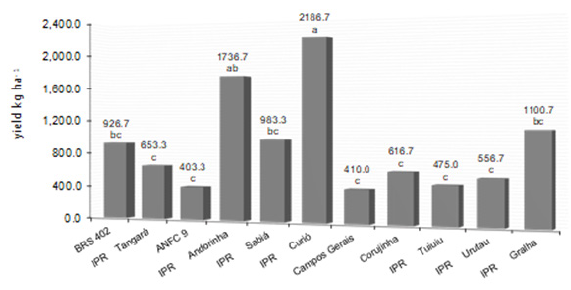- Submissions

Full Text
Modern Concepts & Developments in Agronomy
Experiment Report of Organic Bean Cultivation in Subtropical Soils
Edleusa Pereira Seide*
Department of Agricultural Sciences, State University of West Paraná, UNIOESTE, Marechal C. Rondon, PR, Brazil
*Corresponding author: Edleusa Pereira Seide, Department of Agricultural Sciences, State University of West Paraná, UNIOESTE, Marechal C. Rondon, PR, Brazil
Submission: December 01, 2021 Published: December 17, 2021

ISSN 2637-7659Volume10 Issue 1
Summary
The cultivation of organic grains cultivated in a no-tillage system is a sustainable management system that brings numerous benefits in tropical soils, such as: reduction of erosion, pollutants that reach rivers and improvement in the quality of the food produced. However, its cultivation in conditions with high rainfall and heat requires great care. The present work aims to report the experiences of the research group on agroecology in the cultivation of 11 cultivars of organic beans in a no-tillage system in western Paraná, Brazil. We sought to report the main handlings and inputs used and the result of the yield obtained.
Keywords: Organic grains; Agroecology; Organic no-till system
Experience Report
The present study aims to report on the experiment of the Technological Vocational Center
(CVT) in Agroecology and Cassava in Western Paraná, belonging to Universidade Estadual
do Oeste do Paraná in Entre Rios do Oeste. It is at an altitude of 521m and geographical
coordinates of 24°40’54” S and 54°17’3” O. The soil is classified as a typical Eutroferric Red
Latosol. The total CVT area is 10 hectares and certified organic grains have been grown for
over 10 years.
The soil management adopted is the no-tillage system. In winter as a crop management,
green fertilization, such as oat, turnip, vetch, or a mixture of species (mix) is done, aiming to
perform a crop rotation system. The plants cultivated in the area are: maize, soybeans, beans,
wheat and oats.
In winter the area was cultivated with wheat, and after its harvest, 8t ha-1 of poultry litter
was applied and then the 11 bean cultivars were sown. The cultivars sown were: BRS FC402,
IPR Tangará, ANFc 9, IPR Andorinha, IPR Sabiá, IPR Curió, IPR Campos Gerais, IPR Corujinha,
IPR Tuiuiú, IPR Urutau, IPR Gralha. The main characteristics of each cultivar are shown in
Table 1.
Prior to sowing, the bean seeds were treated with Bradyrhizobium and BiomaPhos. The
mechanical sowing was on October 17th of 2020, under no-tillage system. At sowing, it was
applied in the furrow 437kg ha-1 of natural phosphate, enriched with magnesium silicate,
cast in an electric oven at 1500 °C (yoorin®️). Row spacing was 0.50 m and the number of
seeds per linear meter was according to each cultivar (Table 1). The control of spontaneous
plants was mechanically performed on days 11/04 and 11/05 of 2020. A manual weeding was
performed when the plant was blooming.
Table 1: Cultivars evaluated in CVT and agronomic characteristics: group, average cycle in days, germination percentage, number of seeds per linear meter.

In the area, there were infestations of pod caterpillar (Spodoptera cosmioides) and mite white (Polyphagotar sunemus latus) that required control measures. The product Tracer®️, which is a non-systemic insecticide of biological origin of the spinosyns chemical group at the dose of 50ml ha-1 and Lime Sulfur (1%), was used. There was a low incidence of diseases and therefore no control was performed. In the harvest season there was high and prolonged precipitation, which delayed and prolonged the harvest period, resulting in losses mainly of the later materials. Average yield is shown in Figure 1.
Figure 1: Average yield of organic bean cultivars, cultivated under no-tillage system.

Conclusion
The IPR Curió variety stood out as the most productive, exceeding the national productive average by 104%. The excess rainfall in the crop reduced the quality and productivity of some varieties.
Acknowledgment
Unioeste, Itaipu Binacional, MCTI, Gebana, CVT team.
© 2021 Edleusa Pereira Seide. This is an open access article distributed under the terms of the Creative Commons Attribution License , which permits unrestricted use, distribution, and build upon your work non-commercially.
 a Creative Commons Attribution 4.0 International License. Based on a work at www.crimsonpublishers.com.
Best viewed in
a Creative Commons Attribution 4.0 International License. Based on a work at www.crimsonpublishers.com.
Best viewed in 







.jpg)






























 Editorial Board Registrations
Editorial Board Registrations Submit your Article
Submit your Article Refer a Friend
Refer a Friend Advertise With Us
Advertise With Us
.jpg)






.jpg)














.bmp)
.jpg)
.png)
.jpg)










.jpg)






.png)

.png)



.png)






